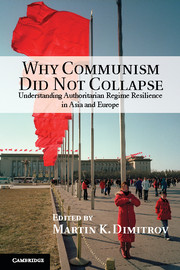Book contents
- Frontmatter
- Contents
- Tables and Figures
- List of Contributors
- Acknowledgments
- Abbreviations
- Part I Reform and Resilience
- Part II Ideology and Resilience
- 3 Ideological Erosion and the Breakdown of Communist Regimes
- 4 Ideological Introversion and Regime Survival
- Part III Contagion and Resilience
- Part IV Inclusion and Resilience
- Part V Accountability and Resilience
- Miscellaneous Bibliography
- General Bibliography
- Index
- References
4 - Ideological Introversion and Regime Survival
North Korea’s “Our-Style Socialism”
Published online by Cambridge University Press: 05 August 2013
- Frontmatter
- Contents
- Tables and Figures
- List of Contributors
- Acknowledgments
- Abbreviations
- Part I Reform and Resilience
- Part II Ideology and Resilience
- 3 Ideological Erosion and the Breakdown of Communist Regimes
- 4 Ideological Introversion and Regime Survival
- Part III Contagion and Resilience
- Part IV Inclusion and Resilience
- Part V Accountability and Resilience
- Miscellaneous Bibliography
- General Bibliography
- Index
- References
Summary
On October 3, 2010, the (North) Korean Workers’ Party newspaper Rodong Sinmun dedicated a signed article to the twentieth anniversary of Kim Jong Il’s essay “The Workers’ Party of Korea Organizes and Guides all the Victories of Our People.” Appearing a few days after the KWP (Korean Workers’ Party) Delegates’ Conference – the first major party meeting to be held in thirty years, at which Kim Jong Il’s son, Kim Jong Un, emerged as heir apparent – the article stressed ideological purity and generational continuity with a hammering force:
What is important among the undying exploits of Kim Jong Il is that he has developed the WPK [Workers’ Party of Korea] into an ideologically pure party equipped with the revolutionary idea of President Kim Il Sung, the Juche idea, invincible militant ranks united as firm as a rock around the headquarters of the revolution and an experienced and tested guiding force advancing the Songun revolution to victory.
The WPK is demonstrating its might as an ideologically pure party guided by the monolithic idea, the revolutionary idea of President Kim Il Sung. Only Juche type blood is running in the veins of all its members and they are advancing along the road indicated by the Juche idea no matter which way the wind may blow. This is the real picture of the WPK.
The whole party has become an organizationally and ideologically integral whole as its all members are united as firm as rock around the Party Central Committee headed by Kim Jong Il and integral body for action and the most elite vanguard ranks transparent in ideology and faith and strong in the sense of organization, unity and militancy. This is the ever-victorious WPK.
- Type
- Chapter
- Information
- Why Communism Did Not CollapseUnderstanding Authoritarian Regime Resilience in Asia and Europe, pp. 99 - 120Publisher: Cambridge University PressPrint publication year: 2013
References
- 6
- Cited by



